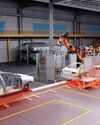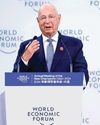
Early on the morning of June 1, 2022, Alex Karp, the CEO of the data-analytics firm Palantir Technologies, crossed the border between Poland and Ukraine on foot, with five colleagues in tow. A pair of beaten-up Toyota Land Cruisers awaited on the other side.
Chauffeured by armed guards, they sped down empty highways toward Kyiv, past bombed-out buildings, bridges damaged by artillery, the remnants of burned trucks.
They arrived in the capital before the wartime curfew. The next day, Karp was escorted into the fortified bunker of the presidential palace, becoming the first leader of a major Western company to meet with Ukrainian President Volodymyr Zelensky since Russia's invasion three months earlier. Over a round of espressos, Karp told Zelensky that he was ready to open an office in Kyiv and deploy Palantir's data and artificial-intelligence software to support Ukraine's defense. Karp believed they could team up "in ways that allow David to beat a modern-day Goliath."
In the stratosphere of top tech CEOs, Karp is an unusual figure. At 56, he is a lanky tai chi aficionado with a cloud of wiry gray curls that gives him the air of an eccentric scientist. He has a Ph.D. in philosophy from a German university, where he studied under the famous social theorist Jürgen Habermas, and a law degree from Stanford, where he became friends with the controversial venture capitalist and Palantir co-founder Peter Thiel. After Palantir became tech's most secretive unicorn, Karp moved the company to Denver to escape Silicon Valley's "monoculture," though he typically works out of a barn in New Hampshire when he's not traveling.
This story is from the {{IssueName}} edition of {{MagazineName}}.
Start your 7-day Magzter GOLD free trial to access thousands of curated premium stories, and 9,000+ magazines and newspapers.
Already a subscriber ? Sign In
This story is from the {{IssueName}} edition of {{MagazineName}}.
Start your 7-day Magzter GOLD free trial to access thousands of curated premium stories, and 9,000+ magazines and newspapers.
Already a subscriber? Sign In

Q & A: Borge Brende
The World Economic Forum president talks with TIME editor Sam Jacobs

Q & A - Rene Haas
Arm's CEO on how his hardware is supporting the Fourth Industrial Revolution

The conflicts looming over 2025
WHEN DONALD TRUMP TOOK THE OATH OF OFFICE AS President in January 2017, his first foreign policy priority was to get tough on China. The Trump 2.0 Administration will continue that work. But when he strides back into the Oval Office in January 2025, Trump will also become responsible for U.S. management of two dangerous wars, the kinds of hot foreign policy crises he was fortunate to avoid during his first term.

Rev Lebaredian
Nvidia's vice president of Omniverse and simulation technology on training AI-powered robots

5 predictions for AI in 2025
New uses and policy questions come into focus

Roy Wood Jr. The comedian on his new stand-up special, the importance of working in food service, and learning from Keanu Reeves
8 QUESTIONS WITH Roy Wood Jr.

A call for global cooperation in the Intelligent Age
Cultivate wisdom along with innovation

The D.C. Brief
IN THE END, THE THREAT OF A FARright revolt proved more menacing than most imagined, as Republican Mike Johnson initially came up short on Jan. 3 during the first balloting to keep him as Speaker.

The digital labor revolution
OVER THE PAST TWO YEARS, WE'VE WITNESSED advances in AI that have captured our imaginations with unprecedented capabilities in language and ingenuity. And yet, as impressive as these developments have been, they're only the opening act. We are now entering a new era of autonomous AI agents that take action on their own and augment the work of humans. This isn't just an evolution of technology. It's a revolution that will fundamentally redefine how humans work, live, and connect with one another from this point forward.

Tech we can trust
Serving humanity's best interests must be at the center of progress